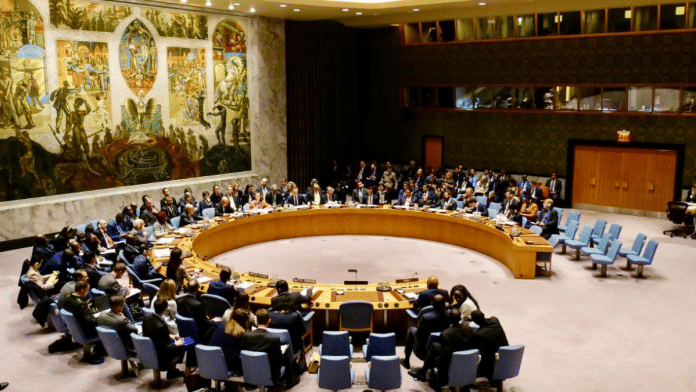New Delhi: Pakistan is set to chair the 1988 United Nations Security Council (UNSC) Sanctions Committee on the Taliban till 31 December, 2025, while also serving as one of the vice-chairs of the Counter-Terrorism Committee. The Security Council makes these appointments based on a consensus among current member-states.
Pakistan’s appointment to these UNSC subsidiary bodies came about a month-and-a-half after the 22 April terrorist attack in Jammu and Kashmir’s Pahalgam left 25 tourists and a Kashmiri local dead. India has said the attackers were trained and facilitated by Pakistan.
“In a significant diplomatic development, Pakistan has been appointed chair of the UN Security Council Committee established pursuant to resolution 1988 (2011), which oversees the implementation of the sanctions measures on the Taliban, and the vice-chair of the Counter-Terrorism Committee, which monitors the implementation of resolution 1373 (2001),” the Permanent Mission of Pakistan to the UN said in a statement Wednesday.
The Mission added, “These appointments represent an acknowledgement of Pakistan’s active engagement with the United Nations system including its constructive role as an elected member of the Security Council. They are also an international recognition of Pakistan’s counter terrorism efforts.”
The appointment as chair and vice-chair is made by the Security Council after a mutual decision is arrived at by the permanent and non-permanent members of the council.
Both the 1988 Sanctions Committee and the Counter-Terrorism Committee are subsidiary bodies of the UNSC. The permanent and non-permanent members of the Security Council become their members on an annual basis.
Pakistan was elected to a non-permanent seat in the UNSC for a period between 1 January, 2025, and 31 December, 2026.
India has been pushing its diplomatic case against Pakistan, particularly with members of the UNSC, following the Pahalgam attack. External Affairs Minister S. Jaishankar spoke with his counterparts in respective member-states (barring Pakistan, China and Somalia) and presented India’s case after the attack. Also, the government has sent seven all-party delegations, led by Members of Parliament, to capitals of all UNSC member states, except Pakistan and China.
The all-party delegations also travelled to member states of the UNSC that will be assuming five non-permanent seats starting 1 January, 2026. The five countries elected on 3 June for a two-year term between 2026 and 2027 are: Bahrain, Colombia, Democratic Republic of Congo, Latvia and Liberia. These countries will succeed current non-permanent members Algeria, Guyana, Republic of Korea, Sierra Leone and Slovenia.
Also Read: Modi’s China remarks not as big a leap & Global Times dissects India’s manufacturing gamble
What are these two bodies
The Sanctions Committee was established in 2011, pursuant to the Security Council resolution 1988. The committee is mandated to look after sanctions imposed by the UNSC on the Taliban, conducts periodic review of names of individuals sanctioned, conducts outreach activities and reports to the Security Council on implementation of sanctions.
Sanction measures allowed under resolution 1988 include asset freezes, travel bans and arms embargoes. The chair convenes and presides over meetings of the committee.
The guidelines of the subsidiary body make it clear that all decisions of the 1988 Sanctions Committee are undertaken by consensus, and if such a consensus is not arrived at, then the matter can be submitted to the Security Council.
India was a chair of the committee in 2021 and 2022, the last time it was a non-permanent member of the UNSC. India also chaired the Counter-Terrorism Committee in 2022.
This is the first time Islamabad has been made chair of the 1988 Sanctions Committee. The Taliban returned to power in Afghanistan in August 2021, with tacit support from Islamabad, though ties have been strained since.
Last week, Islamabad announced that it will upgrade its diplomatic ties with the Taliban regime in Afghanistan, with the appointment of an ambassador to its mission in Kabul. Pakistan followed China in appointing an ambassador. The decision followed a trilateral meeting between the leaders of China, Pakistan and the Taliban.
India does not recognise the Taliban regime, but it maintains a technical mission in Kabul.
The UNSC established the Counter-Terrorism Committee (CTC) through the adoption of resolution 1373 in the aftermath of the 11 September 2001 terrorist attacks against the United States.
The CTC, assisted by the Executive Directorate (CTED), carries out policy decisions and country visits across UN member-states, in an effort to aid the nations in combating terrorism. Pakistan has been appointed as vice-chair to this body.
Algeria has been appointed as the chair to the body for the rest of this year, while France and Russia are the other vice-chairs.
Meanwhile, Denmark has been appointed chair of the powerful 1267 Sanctions Committee of the UNSC, which deals with sanctions against al-Qaeda and the Islamic State of Iraq and the Levant (ISIL).
For India, the 1267 Sanctions Committee is important given that a number of Lashkar-e-Taiba (LeT) terrorists including Zaki-ur-Rehman Lakhvi have been sanctioned under this committee.
(Edited by Ajeet Tiwari)
Also Read: UN Security Council reaffirms support for Colombia peace process






